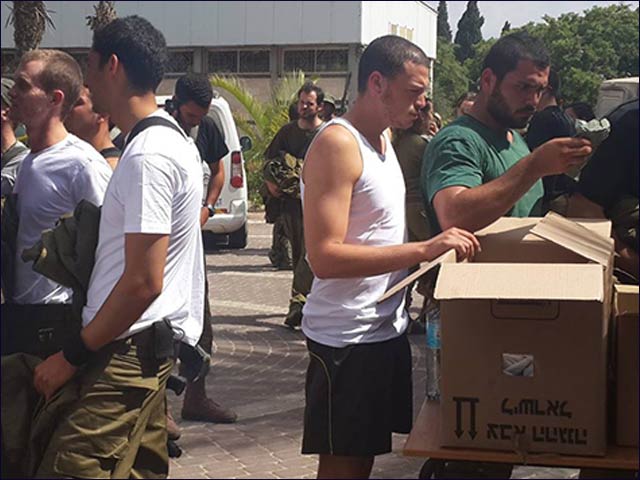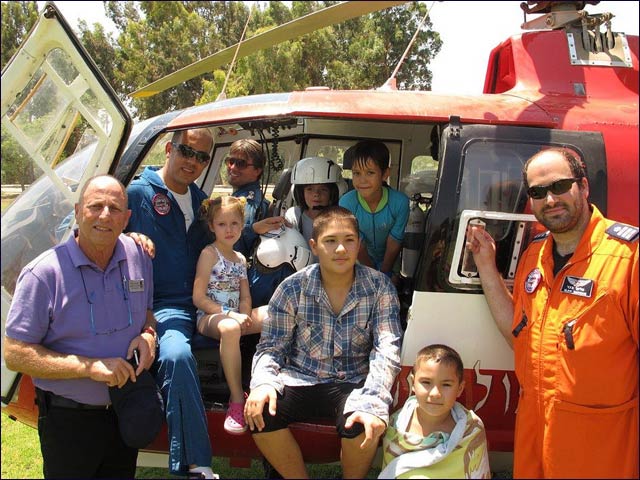By Avigayil Kadesh
The spirit of giving has taken hold of Israel, as thousands of Israeli citizens bring food and personal-care items to the IDF soldiers serving in Operation Protective Edge, and thousands more tend to soldiers’ loved ones and southern families by offering help with everything from shopping and cooking to babysitting and dog-walking.
The examples of Israelis caring for one another are so numerous it would be impossible to mention them all. Some of the initiatives are grassroots and spontaneous, while others are sponsored by established organizations that see to the needs of soldiers year-round.
The vast extent of the efforts is only possible because of social media. WhatsApp, Facebook, Twitter and similar means quickly connect people who want to help, and spread the word far and wide.
Rallying for the troops
The Israel Defense Forces provides its troops with food and supplies, of course, yet sometimes there are shortages or delays in the supply line, especially in wartime. Moreover, battle rations leave some fighters hungry. Ordinary Israelis have proved more than willing to fill those gaps – and then some.
In fact, at least one group of reserve soldiers found themselves with a huge surplus of care packages and decided to share them with hospitalized Jewish, Bedouin and Muslim children.
“We received tons of chocolate, snacks and candies from organized groups as well as private individuals and we decided there’s way too much for just us,” an officer from the front told Ynet news. “We brought everything to Soroka hospital and made our way around all four floors to over 100 children. It’s important to give and not just get.”
They are certainly getting. Countless families and grassroots groups are collecting, packing and distributing food and gear for soldiers on a daily basis, delivering it to bases at the frontlines despite the threat of missiles overhead. Pizza, ice pops and ice cream in particular are being showered on weary and hot soldiers.
Early in the conflict, Gedaliah and Elisheva Blum, parents of four children from the town of Eli, launched a website to raise money to buy pizza for IDF soldiers on the front. Their goal was to raise enough money for 1,000 pizzas, but $16,000 poured in over four days from donors around the world. After 3,000 pizzas were delivered, they did not rest but immediately initiated an underwear campaign.

A delivery of socks, underpants and T-shirts from Yashar LaChayal
Leon Blankrot, who heads the organization
Yashar LaChayal (Direct to the Soldier), has been purchasing and delivering specially requested items, such as water backpacks, to soldiers every day of the conflict, as well as visiting injured combatants in hospitals. He noted on the organization’s Facebook page that at Soroka University Medical Center in Beersheva, he came across volunteers from the Druze Youth Organization of Israel visiting and handing out gifts to all the injured troops.
A grassroots effort in Ma’aleh Adumim, dubbed
Project Socks , recruited volunteers to make hundreds of chicken shnitzel sandwiches overnight at a local restaurant, which donated the food. The volunteers delivered them to three bases on July 27 along with additional essentials purchased in southern stores that are hurting for customers.
Buying food, personal-care items and towels for soldiers from suppliers in cities such as Sderot and Ashdod is a win-win concept that many others have also employed. For example, Tel Aviv resident Rivka Cherney launched a GoFundMe campaign to benefit both the soldiers and the small businesses.
“Some soldiers sit in the same underwear and socks for days to up to a week at a time. They do not have enough clothing with them and also are in need of wipes that can help them since there are no showers. Your donations will go to buying socks, underwear, baby wipes, hygiene products, undershirts and snacks,” she writes on her crowdfunding site. “We will be buying all of these products in the cities where the economies have been hit hard due to constant rocket fire.”
For the families
Just as numerous are the groups organizing help and support for the families of soldiers at the front, as well as for families in the south. Nearly every municipality in Israel has a point person or two who has set up a Google Doc where volunteers can sign up to provide anything from babysitting to meals to dog-walking for stressed and shorthanded families of soldiers at the front.
The national food bank
Leket Israel has developed a unique model, working hand in hand with 30 IDF bases to rescue hundreds of thousands of pounds of fresh leftovers for redistribution to the needy.
“With the assistance of 360 volunteers, we provided 3,400 food parcels to partner agencies in Ofakim, Ashdod, Ashkelon, Nitzan, Netivot, Sderot, Beersheva and Kiryat Malachi,” reported Leket founder Joseph Gitler.
Leket also has a project for collecting surplus crops for distribution to the needy, and this has continued throughout the war.
“We have gleaned produce from 15 farmers in the south and continue to evaluate how we can best support them due to their risk of working in open fields,” Gitler wrote. “The shelling in the south is causing extreme hardship to small, locally run businesses, many of whom are standing idle. In an effort to support the poor and bolster the economy in the region, Leket has commenced purchasing food items from southern merchants for distribution to our partner agencies.”
Israeli supermarket-chain founder Rami Levy has reportedly been directing truckloads of food and basics from his warehouses to the homes of all the fallen soldiers since the beginning of Operation Protective Edge.
The Association of Americans and Canadians in Israel (AACI) is offering free psychological counseling to soldiers and their families, in addition to collecting and distributing supplies to the frontlines.
A few hastily set up organizations are focusing on the needs of soldiers’ wives and girlfriends, such as Eshet Chayal (Wife of the Soldier), Nashot Chayil (Women of Valor) and Lift Their Spirits. The latter group raised more than $6,000 through an Indiegogo crowdfunding campaign to provide stress-busting services to these women.
Shira Katz Vinkler, CEO of the
Yerushalmim (Jerusalemite) Movement, says that more than 350 families of reserve soldiers have been matched with 600 volunteers willing to help out wherever needed. Some of them assisted in packing moving boxes, as summer is a prime time to move house and the remaining parent at home is hard pressed to accomplish a move on his or her own.
“We asked people to tell us about women who might need help, and got lots of names. We had soldiers call us from the frontline and say, ‘Please do something nice for my wife.’ Now families know they can contact us,” Vinkler says.
Yerushalmim also sent pizzas and Shabbat meals to each family and helped put together a market at Jerusalem’s First Station featuring the wares of southern merchants.
Many organizations and kibbutzim – even Israel’s Knesset (parliament) and president – bused southern children northward for free summer-camp activities lasting from a day to several days.
Nof Ginosar Kibbutz Hotel on the Sea of Galilee sponsored a fun day for 200 kids from Ashdod and other Gaza-area cities – including 47 from an Ashdod center for blind and disabled children. They went sailing and swimming, toured a medical rescue helicopter, ate nourishing meals and did other exciting activities organized by the hotel’s staff.
 Children of the south tour a rescue helicopter
Children of the south tour a rescue helicopter
during a fun day in the north. Photo by Studio ASome 200 students from the AMIT School in Kiryat Malachi were escorted by their principal, some mothers, female soldiers, National Service volunteers and teachers to Jerusalem for a day of relaxation and sports, without worry about having to run for shelter.
The
Israel Trauma Coalition (ITC) has been sending out reports to international donors every day of the conflict. The umbrella group focuses on strengthening resilience among Israelis, through its partner agencies and five Resilience Centers in the south.
“There are youngsters who voluntarily took it upon themselves to make sure their elderly neighbors make it to a shelter on time; there are Resilience Centers helping people deal with trauma; and trauma experts lending a patient ear,” ITC Director Talia Levanon reported.
“In the past three years, we at ITC have trained spiritual leadership (rabbis and imams) to lead their community in crisis. Spiritual leaders were trained to be a bridge between their communities and the local and formal government. They were trained in providing first emotional aid, being part of the response system and contributing to a more resilient community.
“In the past two weeks we’ve seen the fruits of this training. One rabbi, leading a rather large community, took half a day to call every single house where a soldier was recruited, talk to his wife or parents, and see if there’s anything they need, if there’s anything he or their community can do for them.”
Many people in northern communities have offered respite accommodations to residents of the south in their private homes.
Children of Kfar Aza by the Gaza border, hosted by the community of Nir Haemek in the north, pitched in to build a rock and cactus garden for the local school as a thank-you gift to their hosts. “They talked together about the cactus’ ability to adjust to mostly any situation,” said Levanon.
Resilient, just like the Israelis who planted them.